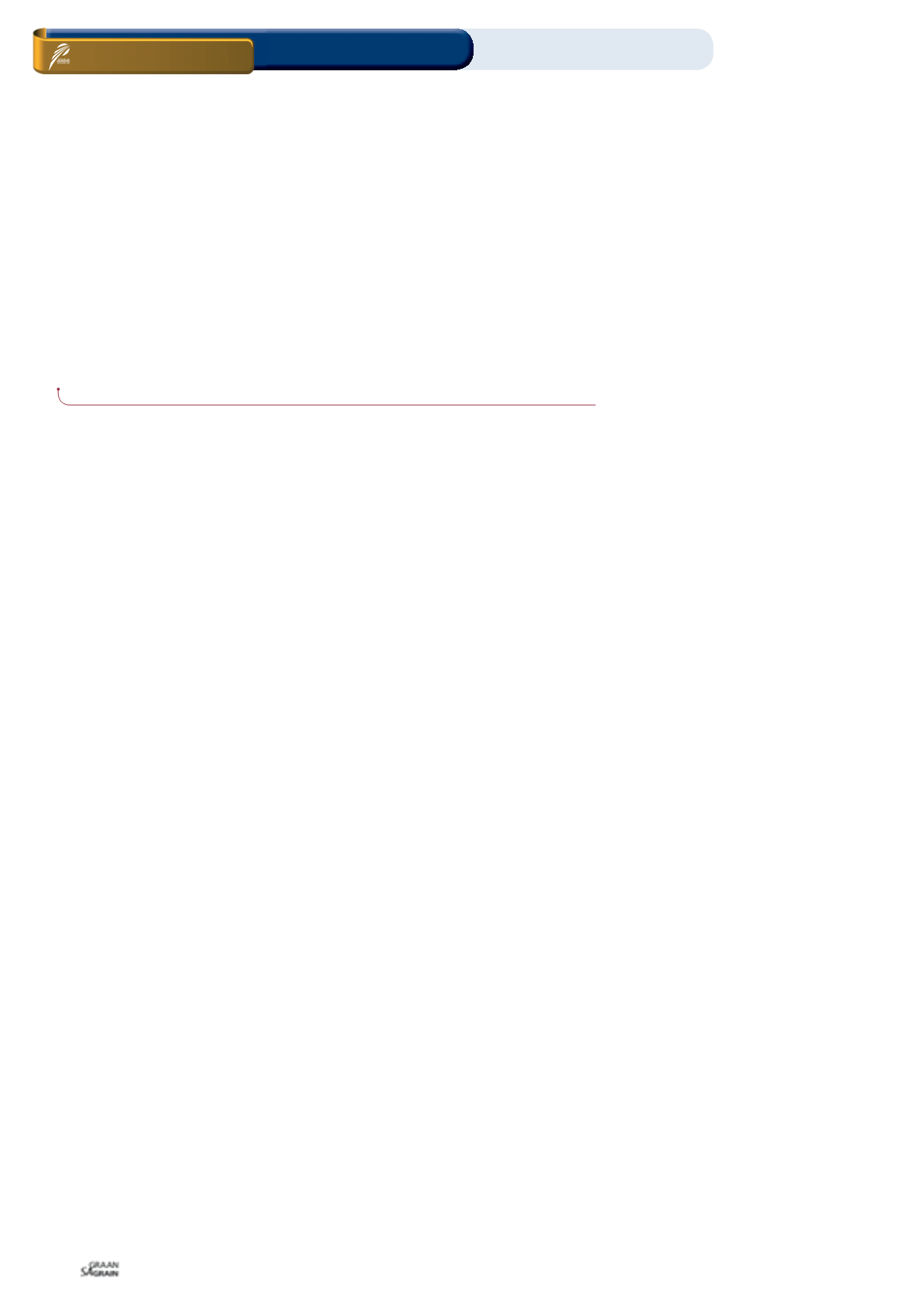
Julie 2014
56
Has producer hedging
entered a new era?
–Determining if Capewheat producers tradingdirectly onSafex are
decliningand the reasons for this
W
hen the South African Futures Exchange (Safex)
Agricultural Products Division (APD) was formed in the
early 1990s after the demise of the marketing boards,
the support anddirect participationof producers on the
exchangewere core to its long-term success.
A tremendous amount of energy and cost were spent by Safex
and brokers to educate and sign-up primary producers. Most agri-
businesses (ex co-operatives) alsohadbrokingdivisions.
This campaign was extremely successful and a very large per-
centageofmaize andwheat producers inparticular opened aSafex
account through a broker. It was not unusual for many of them
to open accounts with different brokers. Collectively they had an
incredibly important impact on themarket.
However, after approximately 15 years, this is no longer the case.
Industrysourceshave it thatmany, ifnotmostproducers, haveeither
closed their accounts, havean inactiveaccount, orhavescaleddown
on their trading activities. This leads to the hypothesis that direct
participation by producers on the JSE/Safex CommodityDivision is
declining. On the basis of a study conducted in theWestern Cape,
thisarticlewill investigate the trendand try todetermine the reasons
for thedecline.
The role of Safex in the agricultural
industry
The South African government in general subscribes to a free
market policy with regard to the South African grain and oilseeds
industries. Apolicyofminimumgovernment intervention is applied.
The industry therefore is largely self-regulatory.
This specifically applies to the JSE, which functions under licenceof
the Financial Services Board. The only licence currently issued for
tradingagricultural derivativeproducts is in favour of theJSE,which
operates a separate Commodity Division trading in agricultural
commodities, amongothers.
It is thus important for the industry that the JSE operates amarket
whereparticipationbyallpotentialplayers is free, fairand transparent
and that they have the support of core industry groups, including
primary agriculture. Should this be the case, the justification of a
single commodity exchange for a relatively small country likeSouth
Africamakes economic sense.
Alternatively, if there is a decline in producer participation, it is
important to determine what the reasons for this are. Are there
negative influences, or is it merely a natural evolvement of the
market? It also holds secondary consequences for traders and agri-
businesses and financiers whose clientele is taking on a different
risk profile.
Data collection
The primary data for this studywas collected bymeans of a survey
questionnaire containing both closed multiple choice and open-
ended questions. The secondary data was collected through
personal one-on-one interviewswithbrokers (grain tradersandagri-
businesses).
Reasons for using the Western Cape as the
case study
TheWestern Cape is geographically isolated from the rest of South
Africa since the Karoo separates the summer and winter rainfall
productionareas. Thismakesdefiningsampleboundarieseasier and
clearer. TheWesternCapecropproductionareaand its stakeholders
are thus in someway isolated from the rest of SouthAfrica and it is
for this reason that it was chosen as the sample area for this study.
Unnecessary variables which could influence the results negatively
couldmore easily be excluded from the sample and the datawould
thereforebemuchmore accurate and easier toobtain.
TheWesternCape is the largestwheat productionprovince inSouth
Africa. It also mainly produces wheat and to some extent barley
in the Southern Cape, thus there are limited other crops that will
influence the data and ultimately the results. Even the contribution
of other farming enterprises such as livestock and deciduous fruits
are limited in the wheat production areas. Furthermore, the pricing
mechanism in theWesternCape isdifferent from theotherprovinces
since it is a local surplus production area. This is in contrast to the
inland areas that are deficit areas. Thus gross income from wheat
is typically less per ton and producers have to pay much closer
attention to its pricing structure.
Analysis of surveyed data
Feedback from the producer respondents are dealt with first,
followedby that of the traders and agri-businesses.
Importance of wheat
At first it was important to establishwhether or not wheat plays an
important role in theWestern Cape grain production areas. Survey
results ascertained that overall (Southern Cape together with
Swartland), 42% of producers depend on grain crops for 67% of
their income. In the Southern Cape, crops make up 40% - 60% of
gross income and in the Swartland, 75% - 80%. In the Swartland it
was estimated that wheat contributes asmuch as 80% - 90% of the
gross income.
Marketing andpricing strategy
This question in the survey attempted to determine at which stage
of the season the producer prices (or sells) which percentage of
his wheat. The response indicated that roughly half of producers
inadvertently hedge themselves by spreading their risk evenly in
ON FARM LEVEL
Hedging / Safex /Wheat producers
Marketing
ANDRÉVANDERVYVER,
senior lecturer: Agricultural Economics, Extension &Rural Development,
Faculty of Natural andAgricultural Sciences, University of Pretoria


